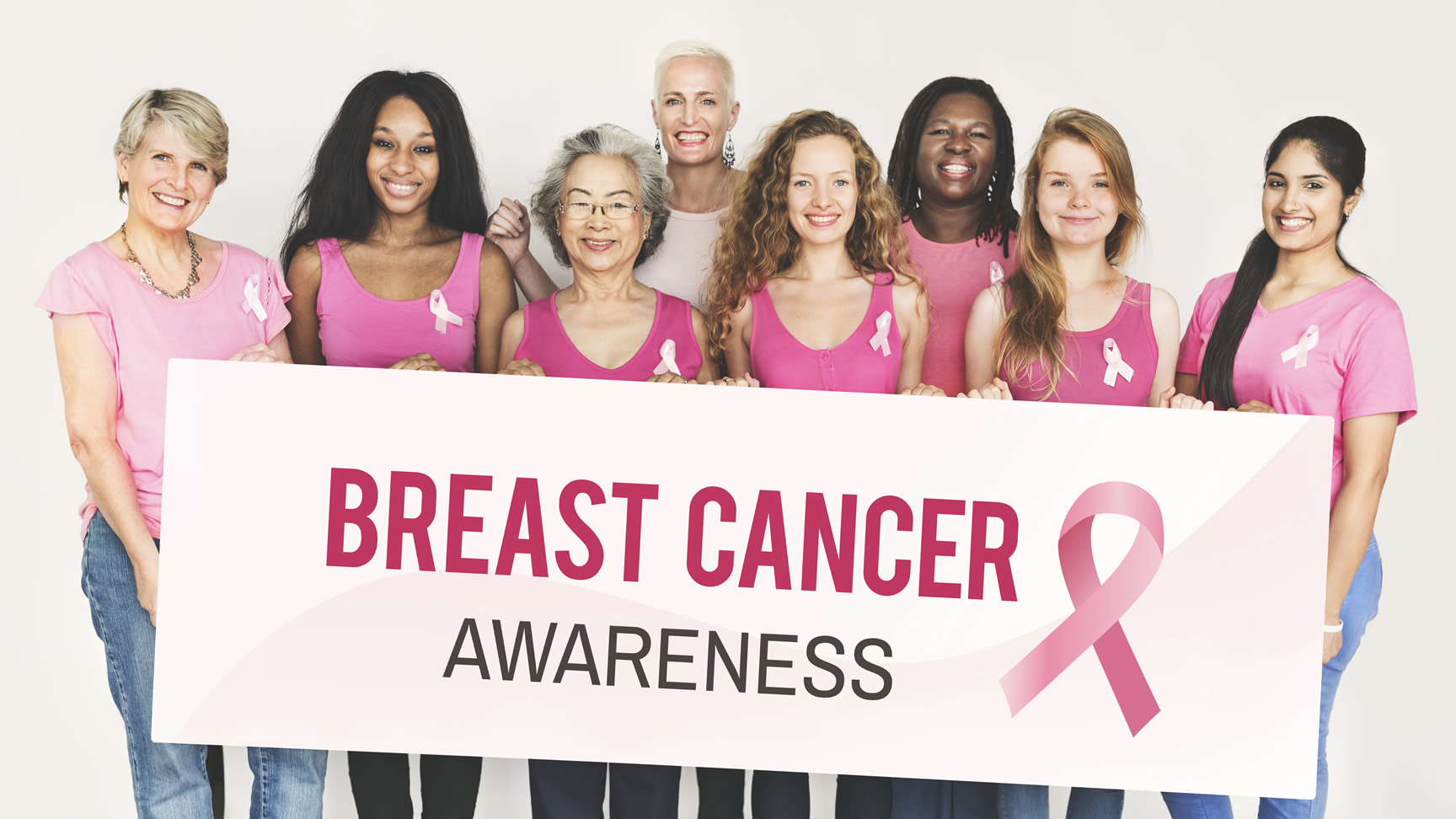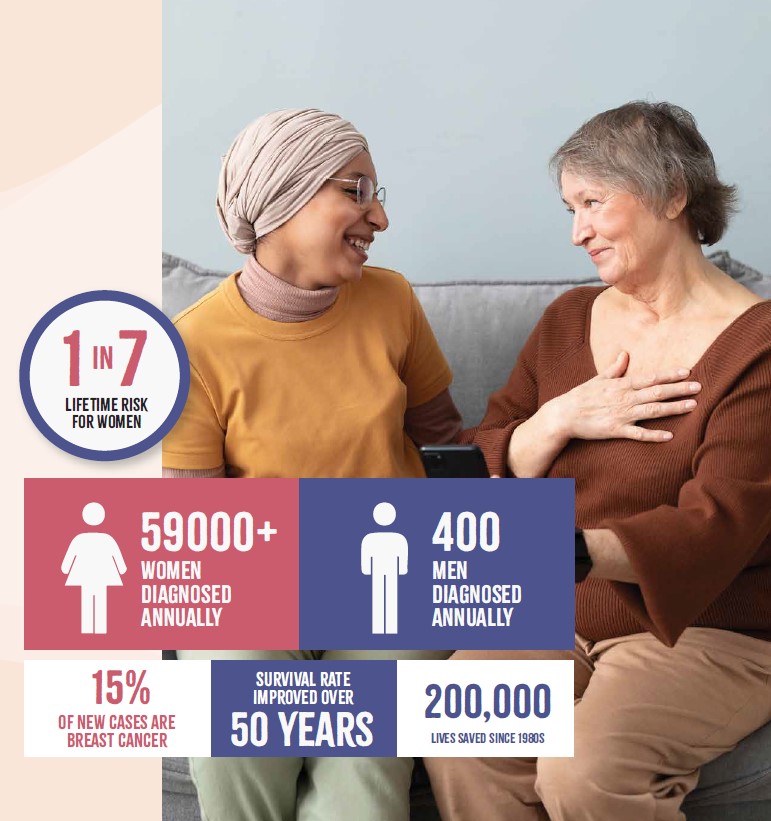Be Breast and Chest Aware: Take Charge of Your Health This Breast Cancer Awareness Month



Be Breast and Chest Aware: Take Charge of Your Health This Breast Cancer Awareness Month
Introduction: Why Awareness Matters

Breast cancer remains one of the most common cancers in the UK with around 56,000 people diagnosed each year – that’s one person every 10 minutes! While survival rates have improved thanks to advances in early detection and treatment, breast cancer can affect anyone, regardless of gender, age, or background. Around 1% of cases occur in men, and there is a concerning rise in diagnoses among younger women.
Awareness and early detection are lifesaving. By learning how to check yourself for signs, understanding risk factors, and seeking help promptly, you can take charge of your breast and chest health.
What is Breast Cancer?
Breast cancer occurs when abnormal cells in the breast or chest tissue grow uncontrollably. These cells can form a lump or tumour and, if untreated, may spread to other parts of the body.
Common risk factors include:
Age:
The risk of breast cancer rises as we get older. Most cases are diagnosed in women over the age of 50, which is why the NHS breast screening programme invites women for routine mammograms every three years between the ages of 50 and 71. However, breast cancer can occur at any age, including in younger women and, more rarely, in men.
Family history & genetics:
Inherited genetic changes can play a significant role. Mutations in the BRCA1 and BRCA2 genes are the most well-known, raising lifetime breast cancer risk to around 45–70%, compared to about 14% in the general population.
Having several close relatives (mother, sister, daughter) diagnosed at a younger age, or with both breast and ovarian cancer, may also suggest a genetic link. People with strong family histories may be referred for genetic counselling, where options such as earlier or more frequent screening, medication, or preventive surgery can be discussed.

Lifestyle factors:
Around 30% of breast cancer cases are preventable through lifestyle factors such as limiting alcohol intake, maintaining a healthy weight, and staying physically active.
- Alcohol intake is directly linked with increased breast cancer risk, and even small amounts raise the risk slightly. In fact, moderate alcohol consumption (around 1-2 drinks per day) has been linked to a 30-50% higher risk of developing breast cancer.
- Being overweight or obese, particularly after menopause, increases risk because fat tissue produces oestrogen, which can fuel certain types of breast cancer. In fact, excess weight can raise the risk in postmenopausal women by up to 30%.
- Physical activity helps reduce risk by controlling weight, balancing hormones, and supporting immune function. Being physically active can cut the risk by around 20%, and NHS guidelines recommend at least 150 minutes of moderate activity each week.
How to Perform an Effective Breast/Chest Self-Check:
Self-checks are one of the simplest ways to stay aware of your breast and chest health. Aim to check once a month, at the same time each month, so you become familiar with what’s normal for you.
Step-by-step guide:

- Look in the mirror: Stand in front of a mirror with your shoulders straight. Check for visible changes in size, shape, or skin texture (such as dimpling, redness, or swelling).
- Raise your arms & Feel In Circles: Lift your arms overhead and look again for changes. Use the flat pads of your fingers, moving in a circular motion. Cover the entire breast or chest area, from collarbone to ribcage, and armpit to sternum.
- Check the nipples: Look for changes such as inversion (unless this is normal for you), unusual discharge, or rashes.
- Feel while lying down: With one arm above your head, use your opposite hand to check each breast and the surrounding tissue. Performing a breast self-exam lying down evens out the breast tissue, which makes it easier to feel changes, especially in larger breasts.
Early Warning Signs to Look Out For
- New lump, swelling or thickening: Look for unusual bumps or firm areas in your breast, chest or armpit.
- Armpit changes: Swelling, lumps, or unusual sensations under the arm.
- Skin changes: Puckering, dimpling, redness, other changes in colour, rashes, or “orange peel” texture.
- Nipple changes: Inversion, rash or unusual shape.
- Nipple discharge: Any unusual fluid from either nipple.
- Size or shape changes: New asymmetry, sagging or contour changes.
Even if symptoms are painless, it’s important not to delay contacting your GP.
Breaking Misconceptions: Breast Cancer Affects Everyone
Although more common in women, breast cancer is not exclusive to them. Around 390 men are diagnosed in the UK each year, often presenting at a later stage because of a lack of awareness. Encouragingly, early detection significantly improves outcomes, regardless of gender.
Prevention: What Can You Do?
While not all breast cancers are preventable, lifestyle changes can reduce risk by around 30%. Steps you can take include:
- Maintain a healthy weight through a balanced diet and regular exercise.
- Limit alcohol: research links higher alcohol consumption with increased risk.
- Be physically active: NHS guidelines recommend at least 150 minutes of moderate activity per week.
- Know your family history: Speak to your GP if breast or ovarian cancer runs in your family.
Supporting Someone with Breast Cancer
- Be available to listen – sometimes emotional support is the most valuable help.
- Offer practical support – lifts to appointments, cooking meals, or childcare can ease daily pressures.
- Encourage self-care – help them find space for rest, relaxation, and gentle activity.
- Respect boundaries – some days may be harder than others.
Recovery and Rehabilitation – How We Can Help at the Thrive4Life Wellbeing Centre
Treatment and surgery for breast cancer can leave lasting effects such as stiffness, pain, and restricted movement. Rehabilitation plays a vital role in restoring function and confidence.
At the Thrive4Life Wellbeing Centre, our team of health and wellbeing specialists support recovery by:
- Easing pain and tension in the shoulders, thoracic spine, and rib cage.
- Addressing restrictions caused by scarring or fascial tightness.
- Restoring mobility and posture to help you return to everyday activities.
Key Statistics to Remember
- 1 in 7 women in the UK will develop breast cancer in their lifetime (Breast Cancer Now, 2024)¹.
- Around 390 men are diagnosed annually (Breast Cancer UK, 2023)².
- 30% of cases could be prevented through lifestyle changes and early action (World Cancer Research Fund UK, 2023)⁴.
- 85% of women survive 5 years or more after diagnosis, thanks to improved detection and treatment (Cancer Research UK, 2024)³.
Conclusion: Take Charge Today
Breast cancer awareness isn’t about fear; it’s about empowerment. By performing regular self-checks, making small lifestyle changes, and seeking help early, you can play an active role in protecting your health.
And if you or someone you love is on a recovery journey, remember that you don’t have to face it alone. Our team at the Thrive4Life Wellbeing Centre is here to support rehabilitation, mobility, and overall wellbeing after treatment.
Be Breast and Chest Aware: Make Self-Checks a Lifesaving Habit
This October, Thrive4Life is leading a major City-wide initiative to raise awareness of breast cancer, fully supported by Lloyd’s, Insurance Families Network and many other city-based corporations. The campaign, “Be Breast & Chest Aware: Make Self-Checks a Lifesaving Habit,” aims to educate everyone on the importance of self-checks and early detection – because when it comes to breast cancer, early action saves lives.
This event is proudly sponsored by the following companies

Live Keynote Talk, followed by a Free, Light Networking Lunch
Thursday, 9th October, Old Library, 12:30 – 1:30 PM
Leading London Consultant Breast Cancer Surgeon, Miss Joanna Franks, joined us live in the Old Library to explain why self-checks are vital, what signs to look for and the importance of early assessment and treatment.
Streamed Webinar
Thursday, 16th October, Teams Webinar, 1:00 – 1:30 PM
For remote and hybrid teams, the session will also be available as a live webinar, with recordings accessible for three months.
Book your place here
Private 1:1 Nurse-Led Breast Self-Check Education Sessions
To support the awareness of the importance of early detection of breast cancer, Thrive4Life is running specialist nurse-led breast self-check sessions at the Thrive4Life Wellbeing Centre, based in the Lloyd’s building, EC3 and virtually for remote workers. These 1:1 sessions will empower staff to carry out breast self-checks confidently and competently, building a lifetime habit.
Thrive4Life has collaborated with expert nurses from the breast cancer awareness charity Future Dreams and the renowned King Edward VII’s Hospital to provide specialist guidance, equipping participants with the knowledge, skills, and confidence to take charge of their breast/chest health.
Each session includes:
- Pre-consultation health questionnaire.
- Private discussion on breast/chest health, self-check importance, and personal risk factors.
- Guidance on family history, screening, genetic testing and HRT where relevant.
- Practical instruction on how and when to perform self-checks.
- Advice on warning signs, symptoms, and next steps if abnormalities are found.
- Hands-on practice with silicone models simulating palpable and harder-to-detect lumps for confidence and technique.
References
- Breast Cancer Now. Breast Cancer Facts and Statistics (2024). Available at: link
- Breast Cancer UK. Male Breast Cancer (2023). Available at: link
- Cancer Research UK. Breast Cancer Statistics (2024). Available at: link
- World Cancer Research Fund UK. Breast Cancer Risk and Prevention (2023). Available at: link
- Breast Cancer Research Foundation. 10 Ways To Help Reduce Your Breast Cancer Risk. Available at: link
- National Library of Medicine. Alcohol Intake and Breast Cancer Risk: Weighing the Overall Evidence. Available at: link
- Breast Cancer UK. Weight and Breast Cancer. Available at: link
- Breast Cancer UK. Physical Activity and Breast Cancer. Available at: link
Categories


